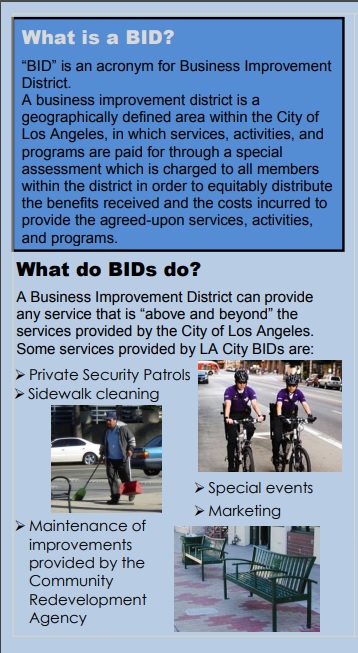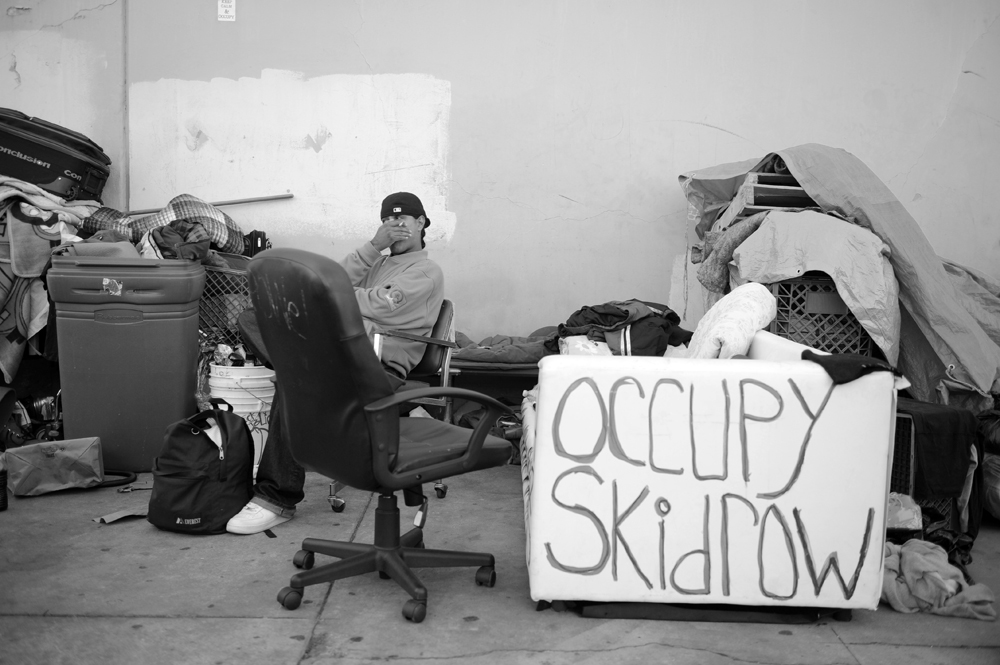[dropcap size=big]B[/dropcap]usiness Improvement Districts in California – including the dozens in Los Angeles — are harassing and abusing homeless people by pushing for cruel and sometimes illegal policies such as confiscating their possessions, making them leave public areas, and tearing down their makeshift shelters, according to a new UC Berkeley report.
The 52-page study by the Public Policy Clinic at Berkeley’s School of Law found that Business Improvement Districts, or BIDs, “are part of a concerted and growing effort to erase from cities any sign of vast inequality while at the same time perpetuating it.” The report concludes that BIDs have found a way to use tax money to fund the efforts.
“The interests of BIDs and the public interest fundamentally conflict,” said Paul Boden, the executive director of the Western Regional Advocacy Project, in a statement released with the study’s findings."BIDs work to manufacture the appearance of prosperity in the city square but that farce comes at the expense of basic human rights for the unhoused poor.”
RELATED: Support Stories Like This & Become a Member of L.A. Taco Today!

The homeless population in Los Angeles is estimated to be between 52,765 – according to the official count – and a recent estimate set at 102,955. The latter figure is based on the number of people believed to have become homeless at some point during the year based on a survey of data collected by the Los Angeles Homeless Services Authority.
There are currently 41 BIDs actively operating in the L.A. area, according to the City Clerk. Many overlap with some of the most actively gentrifying areas of the city. The groups operate as private security and do street clean ups. BIDs argue they aid the homeless and partner with nonprofits to help with homelessness services.
“Our private security patrol is pretty much a first-responder for people who are homeless,” Kerry Morrison, of the Hollywood business improvement districts told the L.A. Times.
A BID’s budget comes from property assessments collected by the city through an arrangement held in a special fund. The authors recommend one way to limit BIDs negative impact is by rewriting state laws to prohibit using property assessment fees for policy advocacy and policing.
RELATED: ‘The Homeless Count Always Ends Around Election Time’ ~ Skid Row Reacts to Drop In Official Figures

[dropcap size=big]T[/dropcap]he study — “Homeless Exclusion Districts: How California Business Improvement Districts Use Policy Advocacy and Policing Practices to Exclude Homeless People from Public Space” — was conducted on behalf of Boden’s group, which is based in San Francisco.
BIDs are not really new. They’ve been around since the 1960s originally to help revitalize dilapidated urban areas. But since the 2000s, the number of BIDs has ballooned in big California cities such as San Francisco and Los Angeles, and so has their clout. The study estimates the state’s 200 or so BIDs spend hundreds of millions of dollars annually.
“During the 20 years from 1975 to 1994, 13 BIDs were established and 61 anti-homeless laws were enacted,” the report said. “During the 20 years from 1995 to 2014, 60 BIDs were established and 193 anti-homeless laws were enacted.”
While business improvement districts have been criticized before for harassing homeless people, the new study argues that they are breaking state law by using mandatory property assessments — some from public entities — to advocate for legislation.
“BIDs seek to enact, maintain, and strengthen laws that criminalize activity like sitting, resting, sleeping, panhandling, and food sharing in public spaces,” the report said. The researchers found that on about 17 percent, or nearly one-fifth of their assessment revenue came from publicly owned properties.
The report also recommends the city “provide more careful scrutiny and regulation of BID activities within their jurisdictions.”







